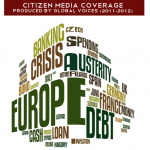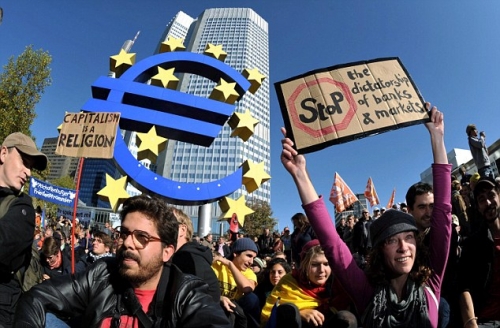 Curious about the actual content of our first ebook on “EU in Crisis”? Here is an extract from the introduction and a few pictures. Please download it, pass it around and spread the word!
Curious about the actual content of our first ebook on “EU in Crisis”? Here is an extract from the introduction and a few pictures. Please download it, pass it around and spread the word!
From the introduction:
Since December 2007, a recession has been affecting the world economy along with national political and social structures. This global recession took a particularly sharp downward turn in September 2008, particularly in the US market, where persistent high unemployment remains, along with low consumer confidence, the continuing decline in home values and increase in foreclosures and personal bankruptcies, an escalating federal debt crisis, inflation, and rising petroleum and food prices. Among others, a report released by Bloomberg in 2009 stated that US $14.5 trillion (or 33 percent) of value of global companies has been erased since the crisis began.

Midnight at Puerta del Sol. Madrid, May 19. Image source: Mikel el Prádanos
As expected, this recession spilled over to most of European countries ), reflecting the assessment that the global financial crisis presents a serious threat to international stability. Until September 2008, European policy measures were limited to a small number of countries (Greece, Spain and Italy), while the European Commission proposed a 200 Euro billion stimulus plan to be implemented at the European level by the countries. The G-20 countries met in a summit held on November 2008 in Washington to address the economic crisis. Followed by another G-20 summit held in London on April 2009. Despite various intervention measures implemented in October 2011 and February 2012, several EU countries are still unable to re-finance their government debt without the assistance of third parties.
While mainstream media, politicians and experts propose a variety of viewpoints and scramble for possible solutions, citizens are voicing their pent-up frustrations in countries making bailout agreements. Many protests held across Europe throughout 2011 became evidence of broader discontent with the handling of such economic crisis. With the widespread use of Internet access, social media and citizen journalism platforms are becoming a center stage for people trying to make sense of what future awaits the Eurozone.
Our goal is to capture the on-going breadth of reflection and debate provoked by the European bailouts, featuring new ideas and alternative responses. By way of translation and through international teamwork, Global Voices curatorial coverage of citizen media on Europe in Crisis hopes to build bridges of understanding between the citizens, international media representatives, activists, scholars and the youth of nations affected by economic crisis today and tomorrow.
The focus here is on citizen media showing how individuals who go beyond the use of social media as a megaphone for individual reflection online, naturally do get involved in the pioneering process of collective creation. Online and mobile tools have also brought new momentum to citizens’ re-use of information – no matter their age – and to experimental labs of “Do It Yourself democracy”.

